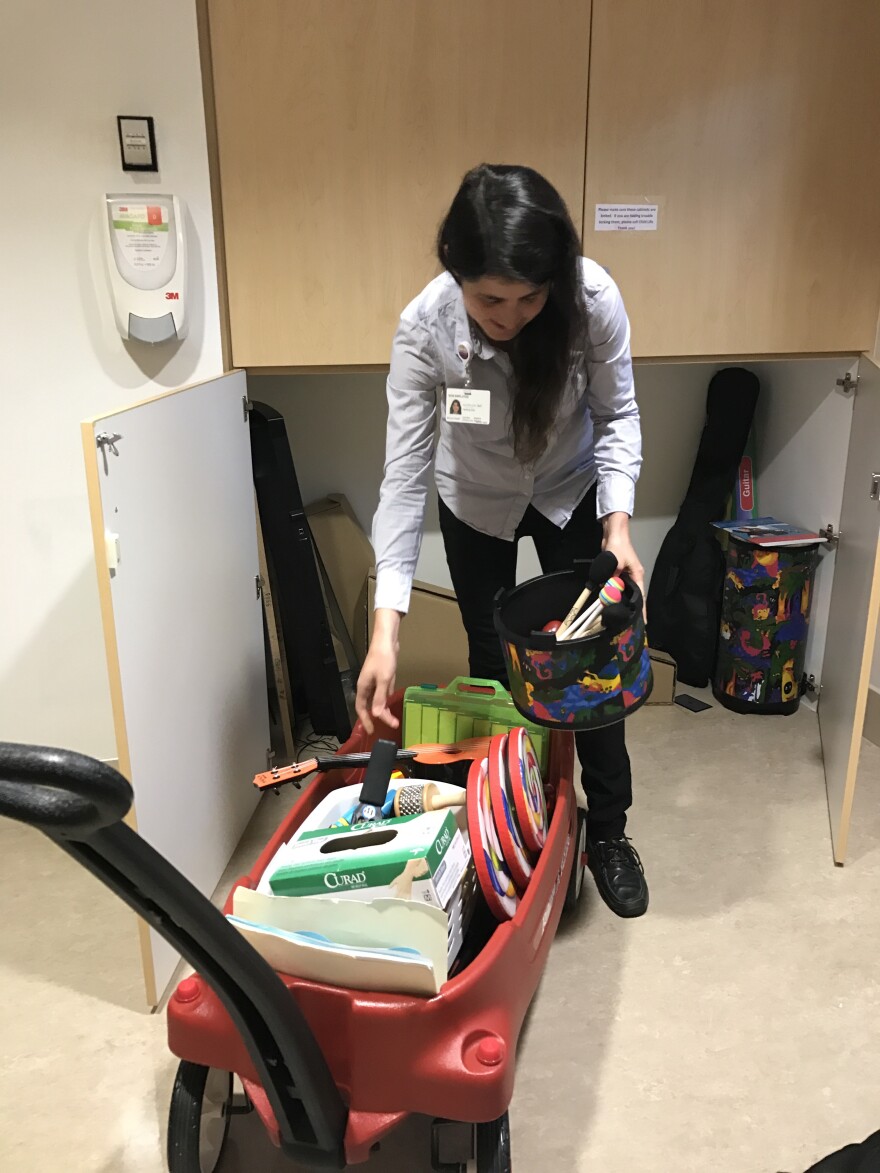A couple of times a week, music therapy is offered to patients in the pediatric unit at Renown Health. It’s a clinical intervention providing a therapeutic benefit. Reno Public Radio’s Anh Gray visits the hospital to learn more.
Doctors. Medical exams. IVs. A hospital can be an unpleasant place for sick children. That’s why the Renown pediatric unit offers music therapy to help reduce pain and anxiety.
Elizabeth Winkler is a child life specialist at Renown.
“You’ve got people poking and prodding, and using language they don’t understand,” Winkler says. “Sometimes moms and dads have to leave the bedside, so their only source of comfort is gone.”
Winkler has seen the effects of music therapy.
“Even if that means like a 20 minute session of music,” Winkler explains, “and they’re smiling and their parents haven’t seen them smile in days, that is so healthy for the healing process."
Music therapist Jodi McLaren is digging out colorful instruments from of a storage closet and is loading onto a red wagon. She wipes each one down with antiseptic wipes.
“The xylophone is pretty popular. I’ll pull that one out,” McLaren says. “For kids who are able to and want to learn how to play a song, they can learn “Twinkle, Twinkle Little Star or “Mary Had A Little Lamb.”

When McLaren visits children in their rooms, she tries to make that time fun and empowering.
“In general, as often as we can we offer kids choices, we do because in a hospital, a lot of times, there’s not as much choices about what happens,” McLaren says. “It’s like, ‘The doctor needs to see you right now,’ or ‘You have to get this IV put in or take out,’ so while I’m in the room, I try to give as many options as possible.”
McLaren pulls the red wagon piled with instruments and makes her way to a patient’s room.
A dark-haired boy with a giant smile sits upright in bed. Thirteen-year-old Anthony Reynolds agrees to let McLaren come in. He’s dealing with complications from Cerebral Palsy. His grandmother Julie Reynolds is at his bedside.
After getting to know each other, McLaren whips out the ever popular xylophone… but Anthony wants to see what else she’s got. McLaren strums on the ukulele.
Jodi McLaren: "Have you ever seen this one before?"
Julie Reynolds: "Yes, his cousins play the guitar."
Jodi McLaren: "Guitar? This one is called a ukulele. You want to try it?"
There’s a lot of giggling in the room, but there’s actually something scientific going on here.
Kimberly Sena Moore is a researcher and an assistant professor in music therapy at the Frost School of Music at Miami University.
“Our brain lights up like a Christmas tree across both hemispheres, both on the superficial neocortex, as well as deeper in the brain,” Sena Moore explains, “all the way down to the brain stem, even the spinal cord is activated.”

Sena Moore says it’s a clinical intervention that’s evidence-based and could help with pain management.
“The primary mechanism of how this works is through an attentional re-direct,” Sena Moore says. “Having the client focus on either making music or listening to music as a way to distract them from their pain and anxiety, as a way to increase their feelings of pleasure, so that their overall perception of their pain and anxiety is reduced.”
If Jodi McLaren’s therapy session has a feel-good quality to them, she explains why.
“When we’re participating in music, whether we’re listening or actually engaging in it, there are hormones released in the brain like dopamine and oxytocin,” McLaren explains, “these are like feel good hormones, and so there’s that element that actually changes your brain chemistry.”
McLaren learns from Anthony’s grandmother Julie Reynolds that he’ll be in the hospital for a few more days to undergo some testing. Reynolds says therapy is giving him a break.
https://www.youtube.com/watch?v=RowKggASpEE
“I definitely enjoyed it and I know Anthony did, too, because he loves music," Reynolds says. It’s nice to see him so happy like that.”
And as McLaren is wrapping up her time with Anthony, he’s letting loose with shakers. They belt out a rendition of Taylor Swift’s hit “Shake It Off.”
https://www.youtube.com/watch?v=c7Mqz7otLP8






